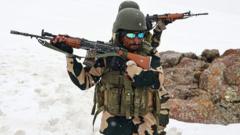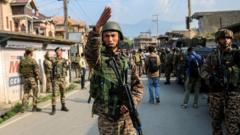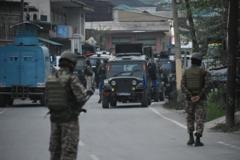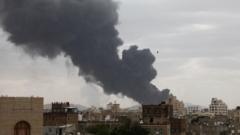In a stark plea for de-escalation, Pakistan's Defense Minister Khawaja Muhammad Asif seeks U.S. assistance to manage rising tensions with India after significant military engagement.
Pakistan's Defense Chief Seeks U.S. Role in India Tension Resolution

Pakistan's Defense Chief Seeks U.S. Role in India Tension Resolution
Defense Minister Asif calls for U.S. support following Indian airstrikes in a volatile Kashmir situation.
In light of escalating tensions in South Asia, Pakistan's Defense Minister Khawaja Muhammad Asif has expressed a desire for increased U.S. involvement in mitigating the crisis with India. His remarks come in the wake of India's military actions targeting multiple locations within Pakistan and Pakistani-administered Kashmir. Reports indicate that these airstrikes followed a recent terrorist incident in Kashmir, resulting in the deaths of at least 20 individuals.
Asif acknowledged that while Pakistan has the right to retaliate, the country has already taken defensive measures by successfully intercepting several Indian aircraft and drones. He pointed out that Pakistani defense capabilities, including jamming technologies, had thwarted additional Indian missile launches, leading to emergency landings of Indian planes.
"Restraint is still being applied," Asif noted, underscoring the fragile nature of the current situation. He emphasized that further escalation could occur if provocative actions continue from India and called for an objective investigation into the conflict.
As tensions continue to build, the potential for renewed conflict remains high, with both nations wrestling with the implications of military aggression. Asif's appeal for U.S. mediation highlights the complex geopolitical dynamics at play and the critical role international actors could play in fostering peace in the region.
Asif acknowledged that while Pakistan has the right to retaliate, the country has already taken defensive measures by successfully intercepting several Indian aircraft and drones. He pointed out that Pakistani defense capabilities, including jamming technologies, had thwarted additional Indian missile launches, leading to emergency landings of Indian planes.
"Restraint is still being applied," Asif noted, underscoring the fragile nature of the current situation. He emphasized that further escalation could occur if provocative actions continue from India and called for an objective investigation into the conflict.
As tensions continue to build, the potential for renewed conflict remains high, with both nations wrestling with the implications of military aggression. Asif's appeal for U.S. mediation highlights the complex geopolitical dynamics at play and the critical role international actors could play in fostering peace in the region.





















